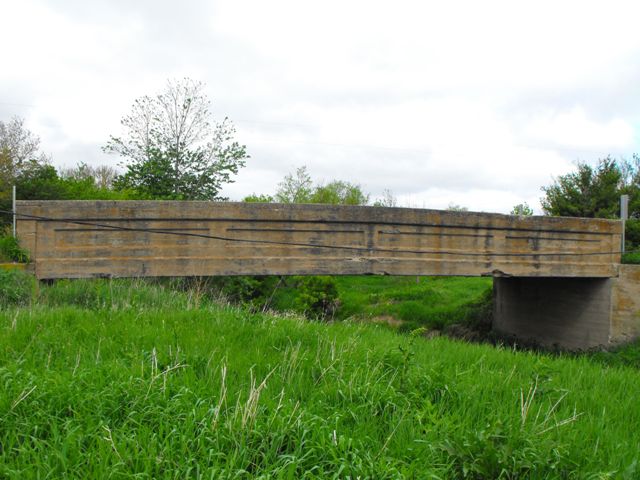We Recommend:
Bach Steel - Experts at historic truss bridge restoration.
Iroquois 400 Bridge
TR-26A Bridge

Primary Photographer(s): Nathan Holth and Rick McOmber
Bridge Documented: May 8, 2010
Rural: Iroquois County, Illinois: United States
1916 By Builder/Contractor: Joseph Klein of Freeburg, Illinois
Not Available or Not Applicable
61.4 Feet (18.7 Meters)
63.0 Feet (19.2 Meters)
18 Feet (5.49 Meters)
1 Main Span(s)
38304509009

View Information About HSR Ratings
Bridge Documentation
View Archived National Bridge Inventory Report - Has Additional Details and Evaluation
This bridge is an excellent example of a standard plan concrete through girder in Illinois. The bridge is unaltered and retains near-perfect historic integrity, and also remains in good structural condition despite never having been repaired or rehabilitated. This particular example is noteworthy for its span of over 60 feet in length, which is quite long for a concrete through girder. For comparison, in the state of Michigan, where a relatively large number of straight chord through girders survive, the largest known span is 50 feet. In Ohio and Indiana, the few concrete girder spans that reach 60 feet are generally curved chord through girders, not straight chord through girders. It appears that 60 feet is also among the longest spans in Illinois as well. Girders longer than this tended to quickly become inefficient and costly in terms of materials. The long length of this Iroquois County girder was likely made easier by the narrow 18 foot deck. Narrower decks require less massive girders to support the load. This bridge is also significant for its very early 1916 construction date. It was around this time when concrete girders began to be built with frequency. As such, this bridge should be considered historically and technologically significant.
Concrete through girders are a nationally rare structure type today. Their popularity only lasted for about 20 years, mainly between 1915 and 1935, mainly because they were inefficient for deck widths much wider than 22 feet. Michigan and Illinois both appear to have the largest numbers of surviving concrete through girders in the country. This does not mean either state has a large actual number however. As such, surviving examples that have integrity should be considered to have historic value. The bridges tend to be heavily built and very durable. Those examples that are located on quiet rural roads such as this one make good candidates for preservation.
![]()
Photo Galleries and Videos: Iroquois 400 Bridge
Bridge Photo-Documentation
Original / Full Size PhotosA collection of overview and detail photos. This gallery offers photos in the highest available resolution and file size in a touch-friendly popup viewer.
Alternatively, Browse Without Using Viewer
![]()
Bridge Photo-Documentation
Mobile Optimized PhotosA collection of overview and detail photos. This gallery features data-friendly, fast-loading photos in a touch-friendly popup viewer.
Alternatively, Browse Without Using Viewer
![]()
Maps and Links: Iroquois 400 Bridge
Coordinates (Latitude, Longitude):
Search For Additional Bridge Listings:
Bridgehunter.com: View listed bridges within 0.5 miles (0.8 kilometers) of this bridge.
Bridgehunter.com: View listed bridges within 10 miles (16 kilometers) of this bridge.
Additional Maps:
Google Streetview (If Available)
GeoHack (Additional Links and Coordinates)
Apple Maps (Via DuckDuckGo Search)
Apple Maps (Apple devices only)
Android: Open Location In Your Map or GPS App
Flickr Gallery (Find Nearby Photos)
Wikimedia Commons (Find Nearby Photos)
Directions Via Sygic For Android
Directions Via Sygic For iOS and Android Dolphin Browser
USGS National Map (United States Only)
Historical USGS Topo Maps (United States Only)
Historic Aerials (United States Only)
CalTopo Maps (United States Only)

